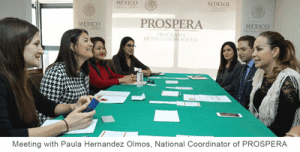Increasingly, Women’s World Banking finds itself deeply engaged in working with national governments to design and implement their financial inclusion strategies. Of course, we have worked with government officials and regulators throughout our history. In fact, some particularly effective engagements have been related to first-to-market products such as microinsurance in Jordan with Microfund for Women and digital savings accounts in Malawi with NBS Bank. In both of those cases we have had to work closely with regulators to either create or adapt regulation to allow these innovative products to be offered in the first place.
But our more recent efforts have been different both in terms of the breadth of our engagement and the level at which we have been invited to participate. Our current work in Indonesia, supporting a newly established Secretariat charged with executing the country’s national financial inclusion strategy, is perhaps the most ambitious example. And more and more, this type of work is emerging as a way that we can have impact on a truly large, indeed, national scale. There is tremendous potential for impact when you work with a government that understands the importance of women’s financial inclusion and puts resources behind driving results.

Mexico’s leadership in the field of financial inclusion extends to its conditional cash transfer program PROSPERA. By digitizing PROSPERA payments, the government is actively working to make G2P (government to person) payments (whose beneficiaries are 98% women) an onramp to financial inclusion. Women’s World Banking has been supporting PROSPERA since 2016 to ensure the program meets women’s needs and addresses the “pain points” women experience as it transitions into a fully digital implementation.
Sustaining the driving for financial inclusion through government transitions
During the Forum, the Ministry of Finance announced the launch of the national financial education strategy to drive usage of financial products and services. But even as we listened to the progress that has been made and the initiatives that can propel Mexico to an inclusive, digital future, there was a feeling of unease among many in the audience. With the July 2018 Presidential election fast approaching, many are worried that the momentum for change had not been sufficiently “entrenched” in the country’s legal, regulatory and bureaucratic systems to extend into the next Administration.
We know that something as profoundly life-changing as financial inclusion must be subject to some degree of politics. In Mexico, the personal leadership of President Enrique Peña Nieto and the governor of the central bank Agustín Carstens have made financial inclusion a priority. We see similar situations of personal and political priority for financial inclusion in India and Indonesia as well.
So are the local Forum participants I spoke to right to be concerned? Will this progress stop after July of next year? I don’t think so, and here’s why: Mexico’s current leadership understands that financial inclusion is a critical pillar of building a more inclusive society. So, even as the government was driving the efforts, civil society and the private sector were engaged as well. Today, the three biggest banks in the country have financial inclusion programs; Telcos are in the game and FinTechs, while still a small player, are increasing their significance in the market.
My sense is that the seeds for financial inclusion have been sufficiently sown in the broader Mexican economy that it has the potential to be self-sustaining even after the election. If this holds true, then other countries with committed leadership can look to Mexico’s example and emulate this approach to ensure that their legacy of financial inclusion endures.
As for Women’s World Banking, we’re even more certain that as long as the political will is there, working deeply with governments is a sure-fire way to maximize our impact. We’ll keep doing our part to support these governments to make sure that women are at the heart of their digital financial inclusion efforts.


